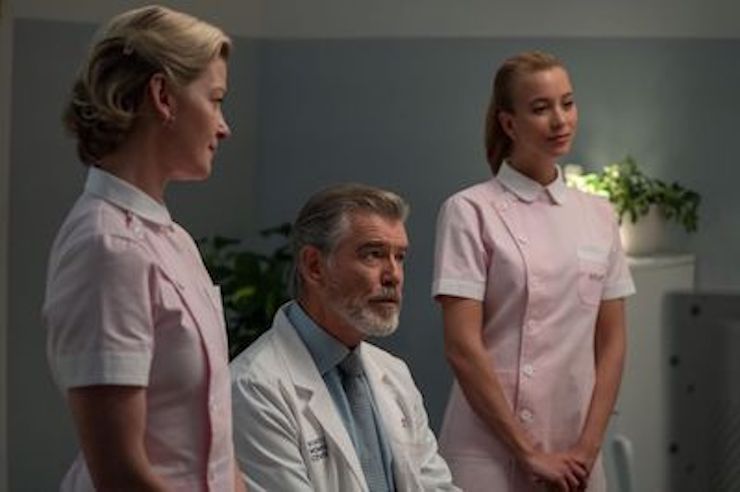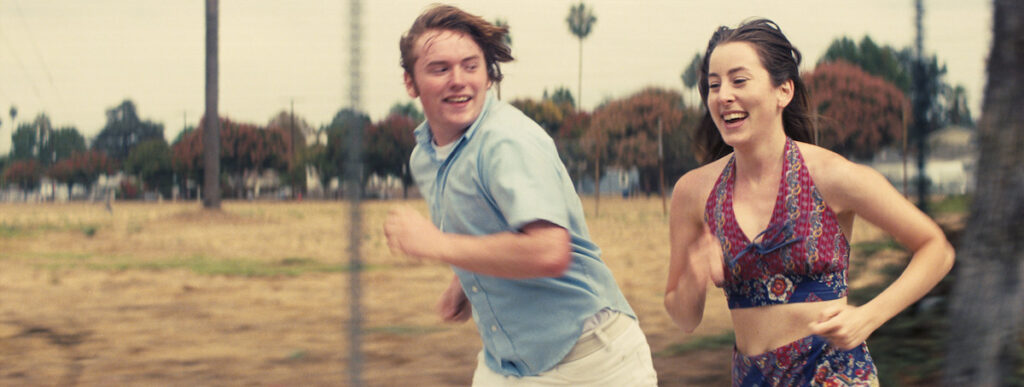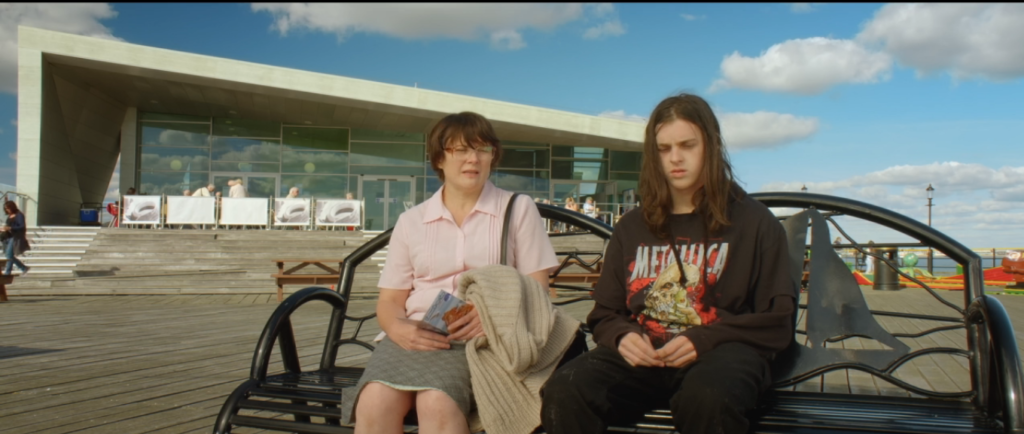Still firmly in my 4 star films, this batch heading to the Top 40 has a doc from the US, and four non-U.S. films, one from the UK, one from Japan, one from Hong Kong, and one from Tunisia. And the U.S. doc is about an Australian woman! Just scanning the Top 40, it’s nice to see how international the films I loved this year turned out to be.
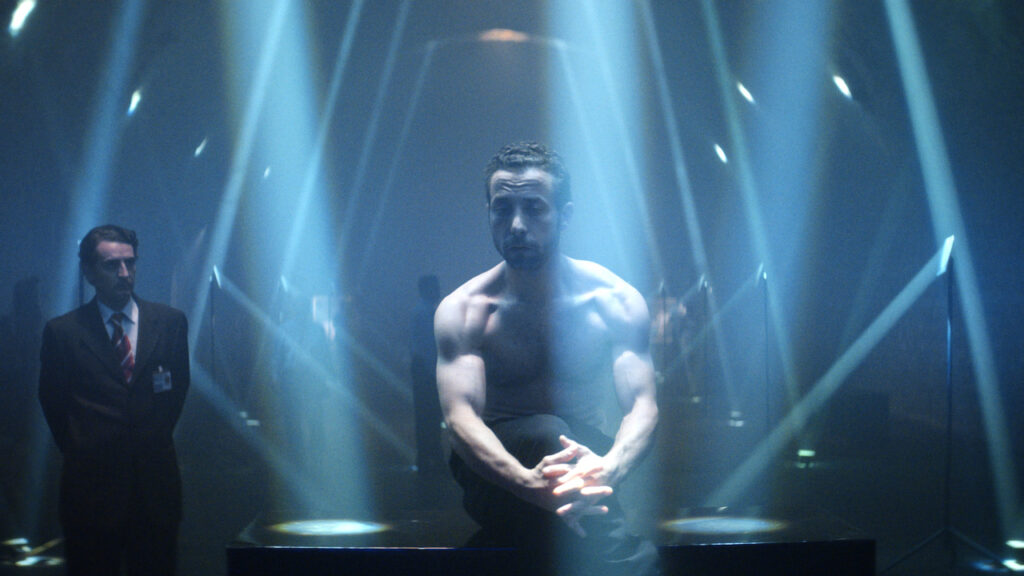
#45 – The Man Who Sold His Skin, directed by Kaouther Ben Hania (Tunisia) – Interesting film; I enjoyed it quite a bit, in fact, I found it rather exciting. Strangely enough, I found the love story to be the least effective part of the film. I suppose it could have been edgier, or maybe delved deeper into the whole commodification of the self, but I found the premise rather intriguing… that a refugee can’t leave his own country until he becomes a commodity in the art world. I find the art world so strange anyway. Also, I loved Monica Bellucci as the mysterious Soraya. I always love that kind of matter-of-fact rather inscrutable type. Cinematography, production design, and editing are all top notch as well.
#44 – True Mothers, directed by Naomi Kawase (Japan/France) – A mother fighting for her child is a force to be reckoned with. In TRUE MOTHERS, Japanese director Naomi Kawase gently and thoughtfully explores the conflict between two women and their claims to motherhood. After trying to get pregnant for several years, Satoko and her husband Kiyokazu see a television spot that introduces them to ‘Baby Baton,’ a non-profit on a remote island run by the saintly Mrs. Asami that pairs couples who cannot have children with women (often teens) who are unable to care for their babies. The first half of the film focuses on the quiet, but satisfying life of the couple and their adopted child, while showing their journey to adoption in flashback. About half way through this lengthy film, the crux of the story arrives, when a young woman contacts Sakoto claiming to be the child’s real mother and demanding his return.
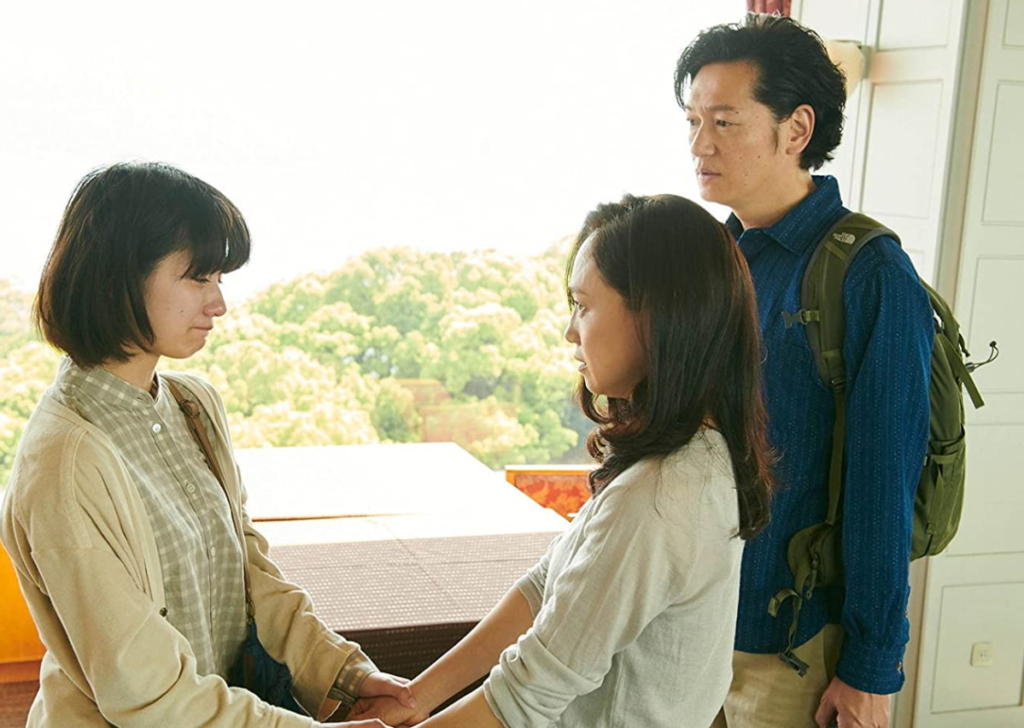
At that point, the movie shifts its perspective entirely, and we are introduced to a sweet, teen girl named Hikari and follow her story as she falls in love with a classmate and becomes pregnant. Her family is ashamed and she is shuffled off to ‘Baby Baton’ where she finds warmth and caring among the staff, and the other pregnant women in residence. After giving up the baby, Hikari falls on hard times, running away from her controlling family, delivering newspapers to make some money, and getting involved with some unsavory characters. At her lowest point, the two stories come together again. It all sounds a little melodramatic and over-the-top, like a worn plot from ‘Days of our Lives,’ but under the direction of Kawase, whose tender handling of the characters undercuts the sensationalism, it’s a lovely and sad story that resolves beautifully.
#43 – Twilight’s Kiss, directed by Ray Yeung (Hong Kong) – While representation for gays is much better in the movies than,say, twenty years ago, it’s still not outstanding. And representation for older adults, much less older gay adults, is still pretty abysmal. Ray Yeung’s TWILIGHT’S KISS embraces the challenges of aging gay men, and even more daringly, does so in Hong Kong, where that generation is still fairly uncomfortable with homosexuality. Pak is well past retirement age, but he still love driving his taxi every day. He’s got a happy family, wife, kids, grandkids, and a habit of cruising public toilets for sex with men. It is on one of these unsuccessful cruising visits that he encounters Hoi, similar in age, reading on a park bench. Hoi, it turns out, is retired, is long divorced, and living with his son’s family. He is also gay, but he’s not into cruising. Both men are closeted, but Hoi, at least, has a circle of gay friends who are doing their small part with the younger generation, to set up a gay senior home so that they will have somewhere to go if their families are unable to help them.
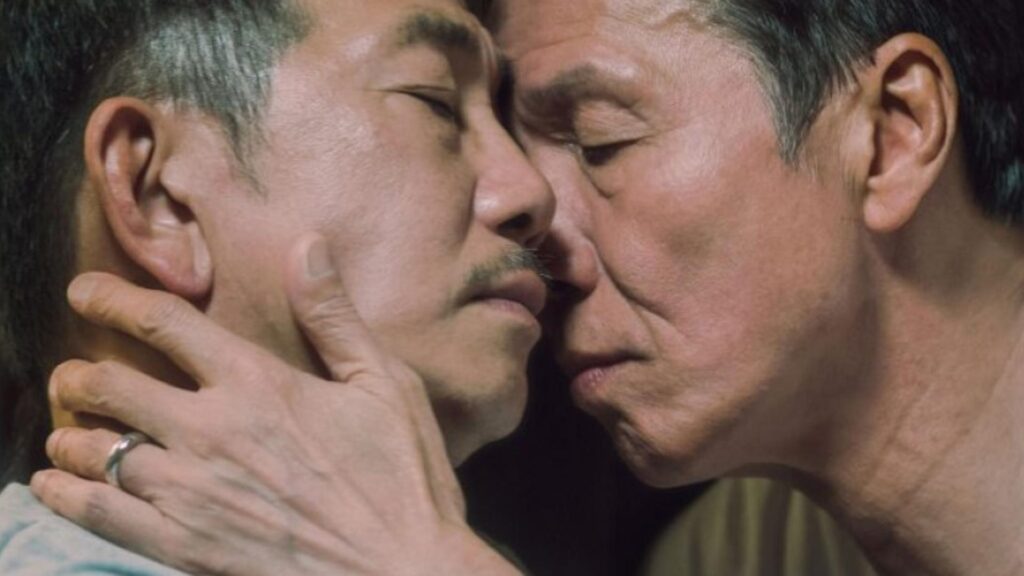
“Yeung has crafted a gently powerful story of two men to meet in their 70’s, form a sexual bond, and then suddenly realize that they are falling in love. Pak in particular is in a precarious position, and while his marriage doesn’t seem all that loving, and certainly lacks any passion, Pak’s wife, Chin, is never portrayed in a negative light. There is clearly true affection between them. As the two men’s relationship progresses, they even start to imagine a live together might look like, but that’ seems a chasm to wide to bridge, and the film ends on an ambiguous note that some might be frustrated by, but i felt seemed much more true to life.
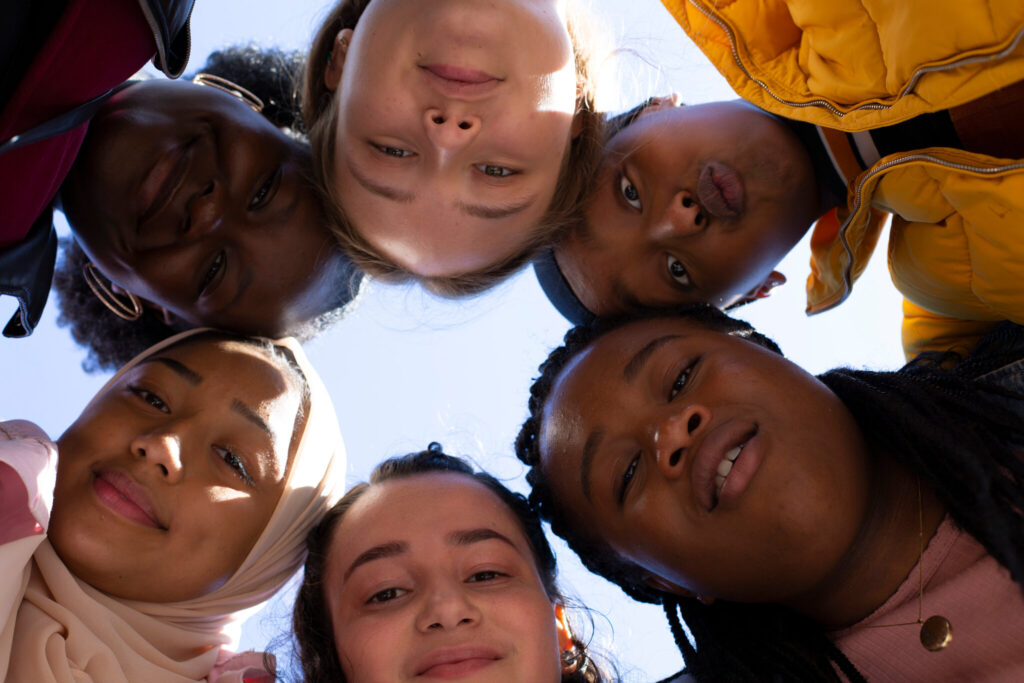
#42 – Rocks, directed by Sarah Gavron (United Kingdom) – Ever since her powerful debut, the British TV Movie THIS LITTLE LIFE, and her big screen debut in 2007, BRICK LANE, I’ve been curious about director Sarah Gavron, but I hadn’t seen anything else from her until I stumbled over ROCKS. Slightly reminiscent of Céline Sciamma’s GIRLHOOD, this sweet but gritty film follows Nigerian-British high-schooler ‘Rocks,’ happily hanging out with her multi-ethnic posse of girlfriends, as she is thrust into, a minefield of adult responsibility when she is forced to take of herself, and her little brother, after her mother abandons them. Without delving too deeply into the harshest of realities, ROCKS still packs a pretty powerful punch, and puts Rocks, and the viewer through quite the emotional wringer. A bright, compelling performance by newcomer Bukky Bakray, as Rocks, and strong support from several of the girls in her posse, ROCKS gives Gavron another opportunity to show her stuff, as she effectively shows us the challenges many kids go through, and the dearth of support that is made available with so many kids in need.
#41 – Playing With Sharks: The Valerie Taylor Story, directed by Sally Aitken (USA) – This fascinating documentary illuminated for me the fascinating and inspiring life of Valerie Taylor. Today, Valerie is 85, and she is still fighting battles on behalf of the underwater world, a staunch marine conservationist with a most intriguing background. Born in 1935, Valerie began diving as a teen, and went on to be one of the few women to compete as a spear fisherman. She got to know a lot of male, champion divers and during her time competing, she found herself drawn into larger and more spectacular spear fishing scenarios, which culminated in her killing a shark with her spear. The moment changed her organically into a marine conservationist, a role solidified by the work she did as an underwater photographer with her husband. As one of the world’s foremost experts on sharks, she worked on a couple of ground-breaking films, the first, a 1971 documentary focused on Great White Sharks, BLUE WATER, WHITE DEATH. From there she and her husband found themselves working on Steven Spielberg’s JAWS, the resulting mania around sharks that developed, stunning them both and inspiring them to redouble their efforts to find government protection for these great, majestic beasts that had been maligned by a work of fiction, and had become the victims of a shark-killing mania that swept the seas. Valerie and her husband, being underwater photographers, use themselves as subjects to show the world just how misunderstood sharks were. Valerie, an attractive blonde in a diving suit, is seen on video hand feeding enormous great white sharks, stroking them and petting them on the nose as if they were huge dogs.
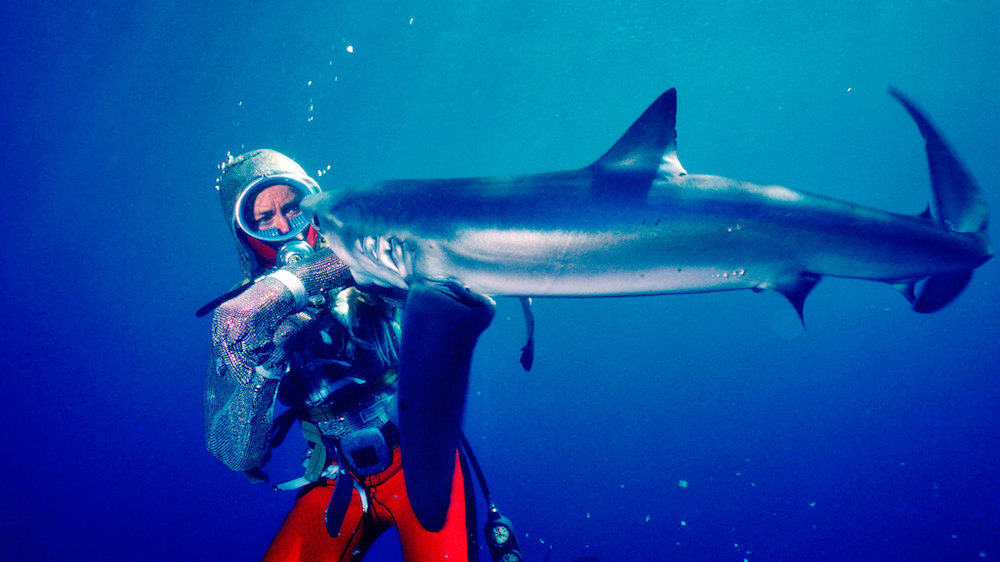
Sally Aitken does a remarkable job giving us such insight into this woman’s life, documenting decades of work in a way that never felt rushed, or incomplete. By focusing on her work with sharks (she had many other underwater passions as well) Sally is able to show both the horror and the glamor that Valerie was surrounded by. The underwater footage is jaw-dropping, much of it belonging to the Taylors, some of it shot for this film. PLAYING WITH SHARKS was riveting, and felt very important and educational at the same time.


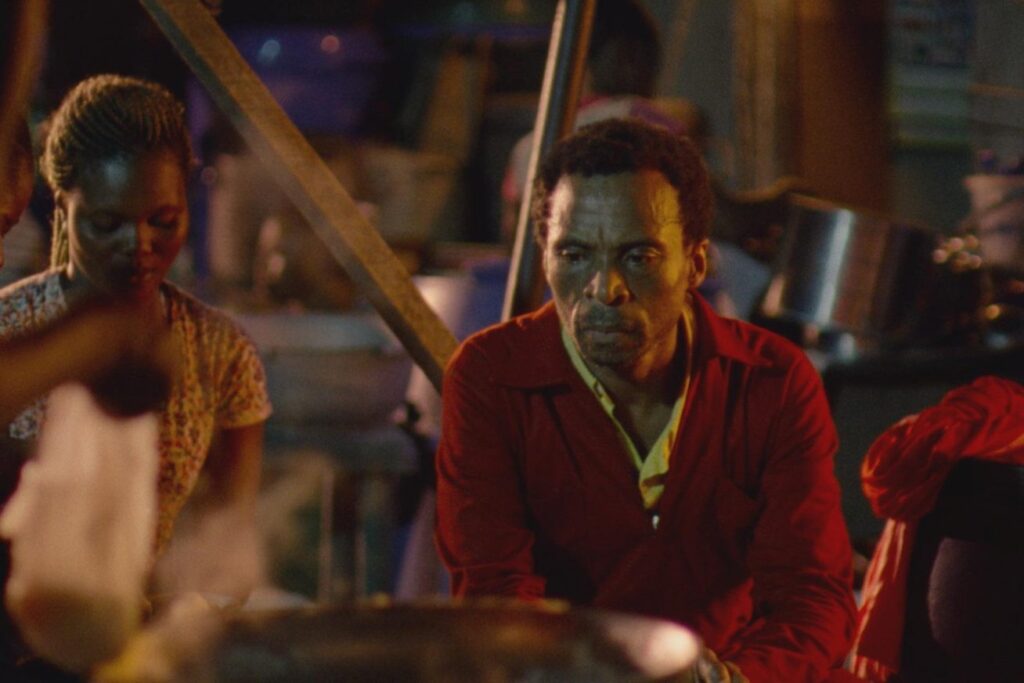

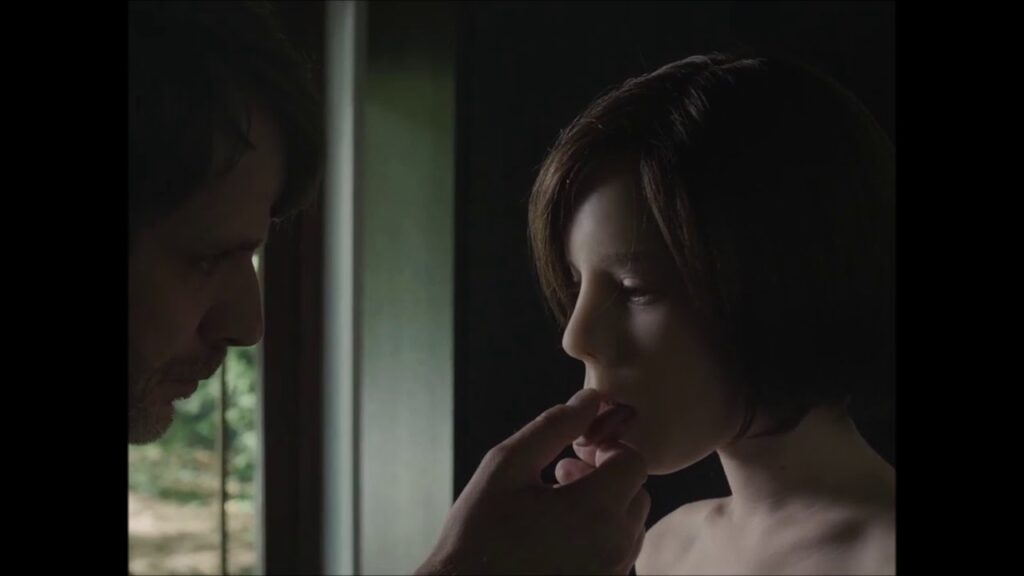
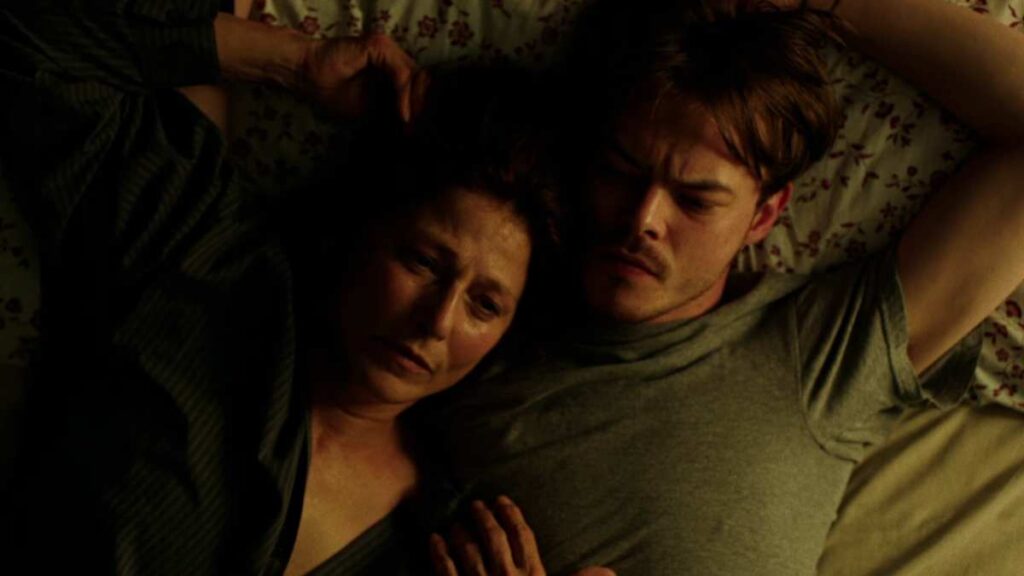
 #61 – Beans, directed by Tracey Deer – Quebecois coming-of-age film set during the Oka Crisis, the turbulent Indigenous uprising that tore Quebec and Canada apart for 78 tense days in the summer of 1990. It was certainly a dark moment in Canadian history, and the archival footage director Deer weaves into the narrative film is incredibly effective to tell this horrifically fraught tale. The coming-of-age story, centering on a 12-year-old girl whose Mohawk name is difficult to pronounce, so everyone calls her Beans, is slightly less successful, although makes for a nice humanistic touchstone while the racial prejudice threatens to smother everything around it.
#61 – Beans, directed by Tracey Deer – Quebecois coming-of-age film set during the Oka Crisis, the turbulent Indigenous uprising that tore Quebec and Canada apart for 78 tense days in the summer of 1990. It was certainly a dark moment in Canadian history, and the archival footage director Deer weaves into the narrative film is incredibly effective to tell this horrifically fraught tale. The coming-of-age story, centering on a 12-year-old girl whose Mohawk name is difficult to pronounce, so everyone calls her Beans, is slightly less successful, although makes for a nice humanistic touchstone while the racial prejudice threatens to smother everything around it.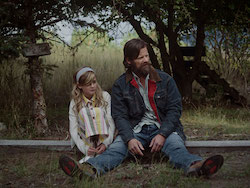 #60 – Cowboys, directed by Anna Kerrigan – There was something about this modern-day western that is also a domestic drama, and a social commentary about gender, that really worked for me. Writer/director Anna Kerrigan hits all the expected tropes then upends them a bit, making them all that more real, and effective. Recently separated from his wife, Troy (Steve Zahn), who is treated for an unspecified mental illness after spending a couple of years in prison, runs off with his trans son, Joe, heading through the Montana wilderness in hopes of crossing the border into Canada. His ex-wife (Jillian Bell) refused to acknowledge their son’s gender, which was causing Joe great amounts of confusion and discomfort. The local law, in the form of a Detective named Faith (Ann Dowd), leads the effort to track them down. When Troy’s medication is lost in the woods, everything grows more complicated.
#60 – Cowboys, directed by Anna Kerrigan – There was something about this modern-day western that is also a domestic drama, and a social commentary about gender, that really worked for me. Writer/director Anna Kerrigan hits all the expected tropes then upends them a bit, making them all that more real, and effective. Recently separated from his wife, Troy (Steve Zahn), who is treated for an unspecified mental illness after spending a couple of years in prison, runs off with his trans son, Joe, heading through the Montana wilderness in hopes of crossing the border into Canada. His ex-wife (Jillian Bell) refused to acknowledge their son’s gender, which was causing Joe great amounts of confusion and discomfort. The local law, in the form of a Detective named Faith (Ann Dowd), leads the effort to track them down. When Troy’s medication is lost in the woods, everything grows more complicated. #59 – Red Moon Tide, directed by Lois Patiño – The Galacian coast in Spain featured in RED MOON TIDE is wild and beautiful, and provides a dark and mythic backdrop for this unique film written and directed by Lois Patiño. This haunting tale is told with an unnerving combination of staged, static shots… on landscapes, groups of people, people alone, mostly still, like mannequins staged for some sort of macabre exhibition, and voiceover, presumably the inner monologues of the frozen townsfolk in tableaux. They are ruminating about a fisherman, Rubio, who is convinced a massive creature is lurking in the depths of the ocean, hunting the shores of the town, as he discovers more and more corpses at sea. He retrieves the corpses to bring the villagers back home, but now his ship has run aground and he himself is among the missing. Along with Rubio, it seems the spirits of the villagers have fled as well, leaving only their bodies… immobile, waiting… for what, we are not sure.
#59 – Red Moon Tide, directed by Lois Patiño – The Galacian coast in Spain featured in RED MOON TIDE is wild and beautiful, and provides a dark and mythic backdrop for this unique film written and directed by Lois Patiño. This haunting tale is told with an unnerving combination of staged, static shots… on landscapes, groups of people, people alone, mostly still, like mannequins staged for some sort of macabre exhibition, and voiceover, presumably the inner monologues of the frozen townsfolk in tableaux. They are ruminating about a fisherman, Rubio, who is convinced a massive creature is lurking in the depths of the ocean, hunting the shores of the town, as he discovers more and more corpses at sea. He retrieves the corpses to bring the villagers back home, but now his ship has run aground and he himself is among the missing. Along with Rubio, it seems the spirits of the villagers have fled as well, leaving only their bodies… immobile, waiting… for what, we are not sure. #58 – Perfumes, directed by Grégory Magne – There’s nothing all that unique about this French comedy, but it’s quite noteworthy, and enjoyable, because it really does everything right. Guillaume (Grégory Montel) is a chauffeur, whose recent traffic violations are making his boss reluctant to use him on jobs. Going through a divorce, Guillaume needs a steady income in order to get a larger home so he can share custody of his daughter, who he adores, so his boss lets him take a client who is known to be difficult. Anne Wallberg (Emmanuelle Devos) is a former celebrity in the perfume world. but she has fallen out of favor and now takes jobs set up by her agent that take advantage of her ‘nose,’ a discerning sense of scents, to mask the smell of a odor-belching factory, or replicate the smell of a fine leather handbag for atmosphere. Anne is soft-spoken, but arrogant and with high expectations, treating Guillaume more as a personal valet than a driver. Their evolving relationship forms the core of the film.
#58 – Perfumes, directed by Grégory Magne – There’s nothing all that unique about this French comedy, but it’s quite noteworthy, and enjoyable, because it really does everything right. Guillaume (Grégory Montel) is a chauffeur, whose recent traffic violations are making his boss reluctant to use him on jobs. Going through a divorce, Guillaume needs a steady income in order to get a larger home so he can share custody of his daughter, who he adores, so his boss lets him take a client who is known to be difficult. Anne Wallberg (Emmanuelle Devos) is a former celebrity in the perfume world. but she has fallen out of favor and now takes jobs set up by her agent that take advantage of her ‘nose,’ a discerning sense of scents, to mask the smell of a odor-belching factory, or replicate the smell of a fine leather handbag for atmosphere. Anne is soft-spoken, but arrogant and with high expectations, treating Guillaume more as a personal valet than a driver. Their evolving relationship forms the core of the film.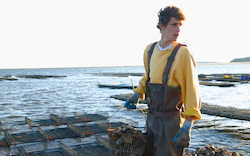 #57 – Fish & Men, directed by Adam Jones and Darby Duffin – Filmmakers do a great job weaving multiple narratives into a cohesive story about the fishing industry from ocean to plate. From Gloucester, MA to Norway, Japan, Montauk NY, Washington DC, Wellfleet, and Los Angeles, this documentary manages to cover a lot of ground and a lot of fascinating, related subjects.
#57 – Fish & Men, directed by Adam Jones and Darby Duffin – Filmmakers do a great job weaving multiple narratives into a cohesive story about the fishing industry from ocean to plate. From Gloucester, MA to Norway, Japan, Montauk NY, Washington DC, Wellfleet, and Los Angeles, this documentary manages to cover a lot of ground and a lot of fascinating, related subjects. #56 – I Was A Simple Man, directed by Christopher Makoto Yogi – One of the many great films exploring grief that I enjoyed last year, this film follows Masao on his gradual journey from life to death. Much of that journey takes place in the form of memory, but like UNCLE BOONMEE WHO CAN RECALL HIS PAST LIVES, Masao is also visited by his beloved wife who died years before and sits with him as he loses touch with his life. Masao led a life of isolation, so it’s also difficult for the family he is leaving behind who now find themselves called upon to help out as his body starts to shut down. While Masao and much of his family live on the Hawaiian island of Oahu, they live on opposite sides, and one son lives on the mainland. It falls upon one of his grandsons, Gavin, to take care of him during his final days. Gavin is perplexed by this situation as he never really knew Masao very well when he was alive, and his rural way of life differs greatly from big city life in Honolulu. Masao barely registers Gavin’s presence, lost as he is in his memories, and preparing for his journey.
#56 – I Was A Simple Man, directed by Christopher Makoto Yogi – One of the many great films exploring grief that I enjoyed last year, this film follows Masao on his gradual journey from life to death. Much of that journey takes place in the form of memory, but like UNCLE BOONMEE WHO CAN RECALL HIS PAST LIVES, Masao is also visited by his beloved wife who died years before and sits with him as he loses touch with his life. Masao led a life of isolation, so it’s also difficult for the family he is leaving behind who now find themselves called upon to help out as his body starts to shut down. While Masao and much of his family live on the Hawaiian island of Oahu, they live on opposite sides, and one son lives on the mainland. It falls upon one of his grandsons, Gavin, to take care of him during his final days. Gavin is perplexed by this situation as he never really knew Masao very well when he was alive, and his rural way of life differs greatly from big city life in Honolulu. Masao barely registers Gavin’s presence, lost as he is in his memories, and preparing for his journey.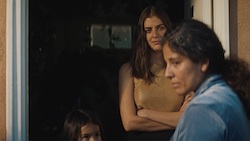 #55 – Ayar, directed by Floyd Russ – This experimental film blends the real life stories of the actors involved, with a fictional narrative about three generations of immigrant women exploring complex mother/daughter relationships and the difficult choices that they face. Ayar wants to attend her daughter’s fifth birthday party. She gets a cake, a balloon, and heads over to her mother’s home where the party is underway. When she arrives, Ayar’s mother, Renata tells her family to take the girl inside, while she confronts her daughter, telling her to leave. It turns out that Ayar left her daughter in Renata’s care five years ago when she headed to Vegas with a man who wanted to make her a singing star. It’s a tense, emotional confrontation, made all the more charged because of the COVID-19 pandemic the characters are dealing with. Most interestingly, the film features brief sequences when the two lead actresses are interviewed about their own life experiences and how some version of their lives ended up becoming the basis for the film’s narrative. This melange of family drama, pandemic horror story, and behind-the-scenes making of a film documentary come together to create something unique and compelling.
#55 – Ayar, directed by Floyd Russ – This experimental film blends the real life stories of the actors involved, with a fictional narrative about three generations of immigrant women exploring complex mother/daughter relationships and the difficult choices that they face. Ayar wants to attend her daughter’s fifth birthday party. She gets a cake, a balloon, and heads over to her mother’s home where the party is underway. When she arrives, Ayar’s mother, Renata tells her family to take the girl inside, while she confronts her daughter, telling her to leave. It turns out that Ayar left her daughter in Renata’s care five years ago when she headed to Vegas with a man who wanted to make her a singing star. It’s a tense, emotional confrontation, made all the more charged because of the COVID-19 pandemic the characters are dealing with. Most interestingly, the film features brief sequences when the two lead actresses are interviewed about their own life experiences and how some version of their lives ended up becoming the basis for the film’s narrative. This melange of family drama, pandemic horror story, and behind-the-scenes making of a film documentary come together to create something unique and compelling.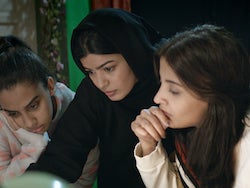 #54 – The Perfect Candidate, directed by Haifaa Al-Mansour – Maryam recently bought a sporty, blue car (almost all of the other cars seen on the roads are white or silver) and she is seen driving it in mammy scenes. Yet she still faces many of the limitations of her gender in modern day Saudi Arabia. Although she is a doctor, she must endure the disgust of many older, male patients who refuse to have her touch them, or even look them in the eye, and would rather a man, even an unqualified man, treat them when injured. In the catalyst situation for the film, Maryam seeks to travel to a medical conference in Dubai to interview for a position at a more progressive hospital, only to be denied when her travel papers are not in order, and her father is unavailable to help renew them. In an attempt to get help from a relative in an administrative government position, Maryam signs up to run for Municipal Council in her town, an action that changes her life and opens her up to possibilities she never thought possible.
#54 – The Perfect Candidate, directed by Haifaa Al-Mansour – Maryam recently bought a sporty, blue car (almost all of the other cars seen on the roads are white or silver) and she is seen driving it in mammy scenes. Yet she still faces many of the limitations of her gender in modern day Saudi Arabia. Although she is a doctor, she must endure the disgust of many older, male patients who refuse to have her touch them, or even look them in the eye, and would rather a man, even an unqualified man, treat them when injured. In the catalyst situation for the film, Maryam seeks to travel to a medical conference in Dubai to interview for a position at a more progressive hospital, only to be denied when her travel papers are not in order, and her father is unavailable to help renew them. In an attempt to get help from a relative in an administrative government position, Maryam signs up to run for Municipal Council in her town, an action that changes her life and opens her up to possibilities she never thought possible.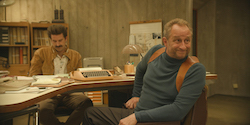 #53 – Keep An Eye Out, directed by Quentin Dupieux – Dupieux has such an offbeat way of telling a story, and this film doesn’t really reveal itself fully until the end, so I won’t give anything away. What starts as a police interrogation, with maybe one or two hints that it’s a little quirky, end up as a bizarre examination of story-telling, or exposition. I really don’t know what else to say about it, but it’s fun and well worth a look at just over an hour.
#53 – Keep An Eye Out, directed by Quentin Dupieux – Dupieux has such an offbeat way of telling a story, and this film doesn’t really reveal itself fully until the end, so I won’t give anything away. What starts as a police interrogation, with maybe one or two hints that it’s a little quirky, end up as a bizarre examination of story-telling, or exposition. I really don’t know what else to say about it, but it’s fun and well worth a look at just over an hour.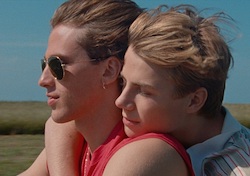 #52 – Summer of 85, directed by Francois Ozon – I wasn’t really expecting a lot from this coming-of-age, cum summer romance between two beautiful young men (barely) in a seaside resort town in France. It seemed fairly straight-forward, except we are immediately dropped into a flashback where we know something terrible has happened. It quickly became apparent that this film had a bit of a melodramatic, nearly camp undertone that underlay the over-the-top romanticism of one young man’s first love, and another’s capriciously tormenting actions that lead to devastating consequences. The passion swirling around the boats on the sea, or in the fishing shop where the two boys work with one of their mothers is sweeping, and something that hopefully we have all been caught up in at least once in our lives. It certainly seemed authentic from a teen point of view, and somehow it all worked for me. Not in a serious way, but in a fun, over-the-top way.
#52 – Summer of 85, directed by Francois Ozon – I wasn’t really expecting a lot from this coming-of-age, cum summer romance between two beautiful young men (barely) in a seaside resort town in France. It seemed fairly straight-forward, except we are immediately dropped into a flashback where we know something terrible has happened. It quickly became apparent that this film had a bit of a melodramatic, nearly camp undertone that underlay the over-the-top romanticism of one young man’s first love, and another’s capriciously tormenting actions that lead to devastating consequences. The passion swirling around the boats on the sea, or in the fishing shop where the two boys work with one of their mothers is sweeping, and something that hopefully we have all been caught up in at least once in our lives. It certainly seemed authentic from a teen point of view, and somehow it all worked for me. Not in a serious way, but in a fun, over-the-top way.  #51 – Sweet Thing, directed by Alexandre Rockwell – A 14-year-old girl goes on the run with her younger brother and a new friend in this nicely balanced fantasy and hard-hitting slice of reality from Alexandre Rockwell, SWEET THING. Billie, named after the famous singer, takes care of her younger brother Nico, and her alcoholic father, who is caring a fairly functional sometimes, and horribly out of control at other times. Mom has taken off to spend time with a boorish boyfriend. Despite this, Billie is filled with caring, and she is the glue that keeps this family going, but it’s a burden to hard for anyone, much less a 14-year-old girl to bear, and when her dad is arrested and sent to rehab, and Billie and Nico must spend time with Mom and boyfriend at his beach house, that’s when things really take a turn for the even worse. Shot in gorgeous, grainy black & white the streets of New Bedford, MA never looked grimmer. Rockwell uses his family for the leads, with his two kids playing Billie and Nico, and their mother playing their movie Mom. As Billie, Lana Rockwell is a star in the making if she wants to pursue acting as a career. She is captivating on screen, with presence, warmth, and a gorgeous look.
#51 – Sweet Thing, directed by Alexandre Rockwell – A 14-year-old girl goes on the run with her younger brother and a new friend in this nicely balanced fantasy and hard-hitting slice of reality from Alexandre Rockwell, SWEET THING. Billie, named after the famous singer, takes care of her younger brother Nico, and her alcoholic father, who is caring a fairly functional sometimes, and horribly out of control at other times. Mom has taken off to spend time with a boorish boyfriend. Despite this, Billie is filled with caring, and she is the glue that keeps this family going, but it’s a burden to hard for anyone, much less a 14-year-old girl to bear, and when her dad is arrested and sent to rehab, and Billie and Nico must spend time with Mom and boyfriend at his beach house, that’s when things really take a turn for the even worse. Shot in gorgeous, grainy black & white the streets of New Bedford, MA never looked grimmer. Rockwell uses his family for the leads, with his two kids playing Billie and Nico, and their mother playing their movie Mom. As Billie, Lana Rockwell is a star in the making if she wants to pursue acting as a career. She is captivating on screen, with presence, warmth, and a gorgeous look.